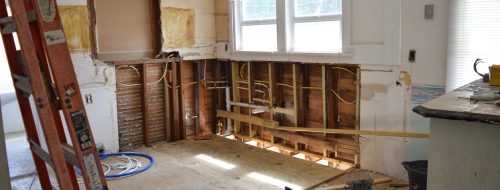Advanced Structural Drying Techniques in Marietta and the Greater Atlanta Area
Water damage is sneaky. It seeps into baseboards, hides behind drywall, and settles into places you wouldn’t think to look, quietly feeding mold infestations. Thankfully, structural drying is all part of the water mitigation process—and it’s one of the most important steps in making sure your home is 100% dry from top to bottom.
At Big Bear Restoration, we take this part seriously. Structural drying doesn’t include pointing a few fans at the floor and hoping for the best. It’s a methodical, science-backed process that targets moisture deep inside your home. Using high-powered equipment and advanced moisture detection tools, we dry out every layer of water damage so you don’t have to worry about mold, rot, or hidden damage popping up weeks later.
Our Structural Drying Process
Structural drying is where we zero in on the moisture you can’t see hiding inside drywall, under flooring, and deep in your home’s bones. Our team brings in industrial-grade air movers, injection floor drying systems, and dehumidifiers, placing them strategically to draw moisture out of building materials without causing further damage.
We also use moisture meters and thermal imaging to track precisely how the drying is going, making real-time adjustments so nothing gets overlooked. By drying out every square inch of your home, we can stop long-term problems like mold, warping, and structural weaknesses before they have a chance to take hold.
Explore Other Water Damage Services We Offer
Completing a water damage restoration project involves multiple steps, and structural drying is just one part of the process.
Our Most Asked Structural Drying Questions
There are several structural drying methods, and at Big Bear, we choose the right approach based on the layout of your home, the materials affected, and the type of water damage you’re dealing with.
- Open drying, which uses outside air and ventilation to dry materials
- Closed drying, where the affected area is sealed and controlled with dehumidifiers and air movers
- Heat drying, which introduces dry, warm air to speed up evaporation in hard-to-reach places
- Desiccant drying, used for larger or more complex structures, pulls moisture out using specialty materials and high-efficiency equipment
Water damage doesn’t just disappear once the visible water is gone. That’s why it’s so important to bring in a professional team like Big Bear Restoration. We use industrial-grade drying equipment, moisture meters, and infrared tech to dig deeper and stop problems before they worsen.
The structural drying process can take two to five days, depending on the amount of moisture involved, the size of the affected space, and the materials that need to dry out. Porous materials like drywall and wood take longer to release moisture than hard surfaces like tile.
At Big Bear, we don’t go by guesswork. We monitor moisture levels throughout the process using advanced detection tools and keep you updated as progress is made.
In many cases, yes. Water-damaged wood can be salvaged, especially when the drying process starts quickly. Wood swells and warps when it absorbs water, but if caught early, professional drying and dehumidification can help it return to its original state.
Our team assesses every affected area to determine what’s restorable and beyond repair. We use controlled drying techniques that reduce the chance of cracking or further warping, and we’ll let you know what can be saved and what might need replacement.
Structural drying prevents a dire water situation from turning into a worse one. It protects your home’s integrity and helps you avoid long-term issues like:
- Mold and mildew, which thrive in hidden, damp spaces
- Warping and rot in wood framing, baseboards, and subfloors
- Lingering odors trapped in materials that didn’t fully dry
- Expensive repairs down the road due to undetected moisture
Clean, Grey, or Black? The Three Kinds of Water Damage Explained
When water enters your home or business unexpectedly, it’s easy to see only the mess…
How a Single Company Simplifies Restoration and Reconstruction
When disaster strikes, like a burst pipe flooding your living room, a fire leaving smoke…

